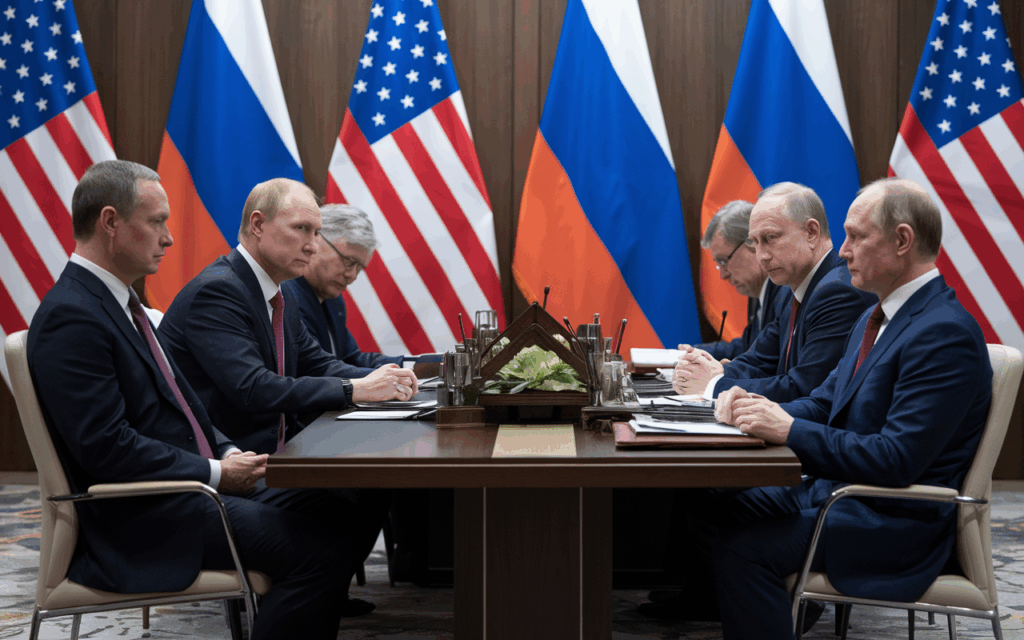Inside Putin’s Fossil-Fueled Victory Lap in Alaska: A Closer Look 🌍🔍
Hello, dear readers! Today, we dive into a complex geopolitical moment that has some serious implications for the future of global politics, particularly surrounding the ongoing war in Ukraine. The recent summit between Presidents Donald Trump and Vladimir Putin in Alaska has ignited considerable debate, and we need to unpack what this means for not just the U.S. and Russia, but the entire world. 🌐
A Summit Shrouded in Controversy
On August 15, 2025, Trump welcomed Putin to Joint Base Elmendorf-Richardson, which, you might say, rolled out the red carpet for a meeting that many see as an appeasement to an autocrat. While ostensibly aimed at discussing the brutal war in Ukraine, the summit seemed to prioritize energy deals and business collaborations more than actual resolutions for peace. 🤝💰
Even amidst ongoing violence in Ukraine, Trump conceded to foundational demands laid out by Russia: no cease-fire and no new sanctions on Russian oil and gas. The summit occurred only days after multiple European leaders rallied behind Ukrainian President Volodymyr Zelensky, indicating a lack of unity on the global stage. Are we witnessing a shift in alliances?
The Heavy Hand of Fossil Fuels ☠️⛽
A significant aspect of this meeting was how energy resources—and the reliance on fossil fuels—play a pivotal role in international relations. As pointed out by environmental policy consultants and experts, breaking the dependence on fossil fuels could be the key to resolving the conflict. But discussions during the summit leaned heavily toward investments and partnerships in the energy sector, leaving many disillusioned about the U.S. stance on environmentally sustainable solutions.
Ukrainian voices at protests in Alaska suggested that a true victory against dictatorship cannot come at the price of embracing fossil fuels, which empower regimes like Putin's. Emphasizing the urgent need for a transition to renewable energy, advocates pointed out that merely swapping dependencies from one type of fossil fuel to another doesn’t solve the core issues at hand.
The Message to the World: What’s Next? 🔮🚦
What does it mean for a U.S. President to openly conflate business interests with diplomatic negotiations? It tells us that, at least for now, appeasement continues to be a favored tactic, despite its potential repercussions. The outcome of these fossil-fueled discussions could have far-reaching consequences not just for geopolitical fairness but also for climate agreements.
Environmental advocates, like Ukrainian environmental lawyer Svitlana Romanko, stress the importance of transitioning away from fossil fuels altogether. “We need an energy transition just as strong so that future generations of Ukrainians never again face a fossil-fueled monster encouraged by appeasement," she warns. It’s a call to action that we must heed.
Final Thoughts 💬✨
This summit between Trump and Putin serves as a stark reminder of the complicated interdependence of global powers, economic interests, and environmental issues. As we continue to watch these events unfold, it’s crucial to engage in discussions not just about energy politics, but about the ethical implications of our choices.
So, what do you think? Is it time for a new approach to foreign policy that prioritizes sustainable solutions? Or are business partnerships the pragmatic choice for now? Let me know in the comments below! 👇💭
Until next time, stay informed and engaged!
[#FossilFuels #PoliticalDebate]

More Stories
Exciting News: The Summer I Turned Pretty is Becoming a Movie
Reflecting on Robert Redford’s Legacy of Integrity and Artistry
Sara Rivers Appeals Dismissal of $60 Million Lawsuit Against Sean Combs: A Fight for Justice in the Entertainment Industry